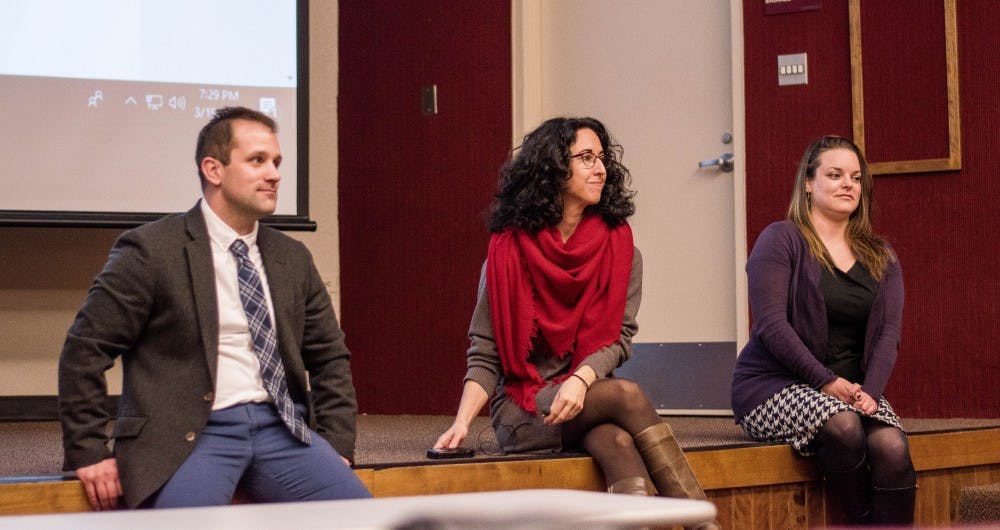Psychology faculty discuss how toxic stress affects children at movie screening

From left, Jim Gerhart, Larissa Niec and Sarah Domoff speak after the showing of the movie "Resilience" about trauma and resilience in childhood and adolescence in Anspach March 19.
Central Michigan University faculty discussed how adverse childhood experiences can lead to toxic stress and impact an individual’s health at a movie screening of “Resilience” Tuesday evening.
“Resilience” is a documentary that explains how childhood experiences like abuse and trauma can lead to negative health impacts like heart disease or cancer later on in their adult life span.
One way to determine how much distress a person has endured in the Adverse Childhood Experience test. The test provides a score that displays how many of these traumatic experiences an individual was exposed to, which can indicate what an individual may be at risk for as they age.
In the movie, it is explained that when a young kid is constantly exposed to abuse or their parents fighting, their brain changes. As a result, these kids tend to act out more in school or fall into destructive behaviors later in life.
However, psychology faculty Larissa Niec emphasized that just because an individual had these adverse experiences does not mean that person is condemned for life.
“Experiencing ACES does not mean that you are doomed to perpetuating a cycle or doomed to carry a scar that will impact you forever,” Niec said.
Part of ACES is being resilient. One half of being resilient is becoming knowledgeable that children and adults both carry these experiences with them as they age, and the other half is taking preventative steps to make change, Niec said.
Psychology faculty James Gerhart focuses more on adulthood in his studies, and sometimes he said that adults do not realize that some of their struggles are from ACES. As a result, when they learn about these ACES, they can become angry at parents or the individuals who put them through the trauma.
Gerhart said that deciding whether or not to go talk to this oppressor is a difficult choice. Moreover, having the conversation may not always be fruitful. The key component of resiliency in adults is processing what happened and letting go of that anger.
“We want the person to be able to let go, so they’re not the one suffering through the anger constantly,” Gerhart said.
The movie emphasized that kids are very resilient, and adults won’t start to notice issues with a child’s behavior for ACES until they reach about fourth grade. However, even if the kids aren’t displaying it in their behavior, the experiences have affected their brain.
Jackson second-year graduate student Sarah Byrne said that learning how kids could react to these experiences is helpful for her as a teacher.
“I know that your brain changes with toxic stress,” Byrne said. “As an educator, that’s kind of important to know that students who have really rough home lives just can’t, they physically can’t think the same way.”
Helping children recover from these experiences comes from a strong support buffer, which is often their parents. Psychology chair Katrina Rhymer said that often parents do not realize the trauma that they are putting their kid through. In turn, they want to learn how to be better parents.
The movie showed that this support system can also be present at school. Some schools have implemented programs that help kids discuss what makes them worried or sad, which helps them process what’s going on in their lives.






